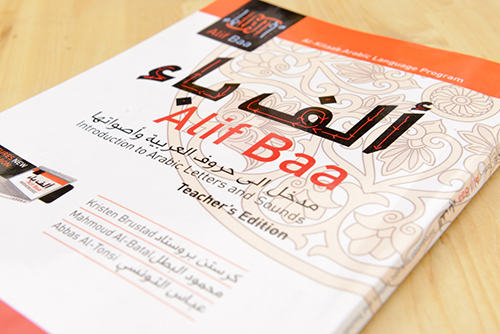Arabic Classes

We are offering six levels of virtual Arabic language classes for Winter 2024.
Register for an Arabic class today!
Mizna offers 10-session classes in spoken and written Arabic with a focus on speaking, writing, and comprehension. Students learn classical Arabic, standard vocabulary and grammar, and are introduced to colloquial dialects including Masri and Shaami. Classes are offered in the spring, fall, and winter, and we often include an intensive summer session. Arabic classes are taught by Dunia Khouri.
FAQ’s
- Beginning I & II
Beginning Arabic I & II focus on developing basic communication skills in Arabic. The class will focus on developing students’ speaking and listening as well as reading and writing.
Beginning I Spring 2024 Tuesdays, April 2–June 4
5pm–6:30pm CSTBeginning II Spring 2024 Thursdays, April 4- June 6
6:30pm–8pm CSTThese courses use: Alif Baa: Introduction to Arabic Letters and Sounds – Third Edition by Kristen Brustad, Mahmoud Al-Batal, and Abbas Al-Tonsi. Beginning I covers units 1–5 and Beginning II covers units 6–9Purchase options for this text include:
• E-book available for rent or purchase. All rental periods include 18 months of access to the companion website.
• Hard copies are also available to purchase and include access to the companion website.
• Access to the companion website. If you already own the book but need access to the website, you can purchase a digital access code.
- Intermediate I & II
Intermediate Arabic I & II is designed for students with an introductory knowledge of Arabic to continue to develop skills in spoken and written Arabic. Students will work with the instructor and classmates in practicing their spoken and written Arabic using classes exercises and text.
Intermediate I Spring 2024 Thursdays, April 4–June 6
5:00–6:30pm CST
Intermediate II Spring 2024 Fridays, April 5–June 7
1:30–3:00pm CST
These courses use: Al-Kitaab fii Taalum al-Arabiyya A Textbook for Beginning Arabic: Part 1. Third Edition by Kristen Brustad, Mahmoud Al-Batal, and Abbas Al-Tonsi. Intermediate I covers units 1–5 and Intermediate II covers units 6–9. Purchase options for this text include:
• E-book available for rent or purchase. All rental periods include 18 months of access to the companion website.
• Hard copies are also available to purchase and include access to the companion website.
• Access to the companion website. If you already own the book but need access to the website, you can purchase a digital access code.
- Conversation I & II
Conversation I & II focus on developing speaking and listening abilities with the purpose of engaging in a basic conversation in Arabic. By the end of the course students will have the confidence to greet people, describe and discuss their environment, communicate feelings, and talk about general situations.
Conversation I Spring 2024 Fridays, April 5–June 7
12:00–1:30 PM CST
Conversation II Spring 2024 Tuesdays, April 2–June 4
3:30-5:00 PM CST
Conversation I requires the textbook Alif Baa: Introductions to Arabic Letters and Sounds Third Edition by Kirsten Brustad, Mahmoud Al-Batal, and Abbas Al-Tonsi, Units 1–5.
• The Alif Baa E-book is available for rent or purchase. All rental periods include 18 months of access to the companion website.
• Hard copies are also available to purchase and include access to the companion website.
• Access to the companion website. If you already own the book but need access to the website, you can purchase a digital access code.
Conversation II requires Al-Kitaab fii Taalum al-Arabiyya: Part 1 Third Edition by Kristen Brustad, Mahmoud Al-Batal, and Abbas Al-Tonsi, Units 6-10.
• The Al-Kitaab E-book is available for rent or purchase. All rental periods include 18 months of access to the companion website.
• Hard copies are also available to purchase and include access to the companion website.
• Access to the companion website. If you already own the book but need access to the website, you can purchase a digital access code.
- Conversation I & II
Instructors

Dunia Khouri
Dunia Khouri is a native Arabic speaker from Lebanon. She has lived in in Minneapolis, Minnesota for 19 years and has had many years of experience teaching Arabic to elementary through high school students. She holds a bachelor of arts degree in Lebanese legal studies from the University of Lebanon, Beirut, Lebanon. Also she holds a masters degree in law from the University of Minnesota’s Law School. She has studied ESL: Literacy and LEP Education and Effectively Advocating ESL at Hamline University, St. Paul. Email the Instructor
Classes taught: Arabic Beginning I & II, Arabic Intermediate I, Conversation I & II

Khaldoun Samman
Khaldoun Samman is a professor of sociology and the former Director of Middle East and Islamic Studies at Macalester College in Saint Paul, Minnesota (USA). Growing up in Zarqa Jordan, he often heard the music of Farid Atrash, Oum Kulthum, Mohamed Abdel Wahab, and other famous Arab musicians and artist. His favorite memories of his childhood usually involved sitting in the courtyard with the extended family eating watermelon and yogurt cheeseballs while the beautiful sounds of the oud, nay, and tabla (also known as doumbek or derbake) filled the background with sweet melodies. When Khaldoun’s family moved to New Jersey, a lot of this came with them. A good chunk of his uncles and aunts and cousins moved to the United States as well in the early 1970s. Although living in separate homes, they maintained a strong extended kinship and continued their huge family gatherings with the same gusto and flare as they did in Jordan. It was in this immigrant environment that he completely internalized the totality of the experience, both melodically and culturally, of Middle Eastern music. Khaldoun has been studying Middle Eastern percussion intensively over the past ten years, traveling across the United States and to Jordan to study with the masters of Arabic drumming. Email the Instructor


